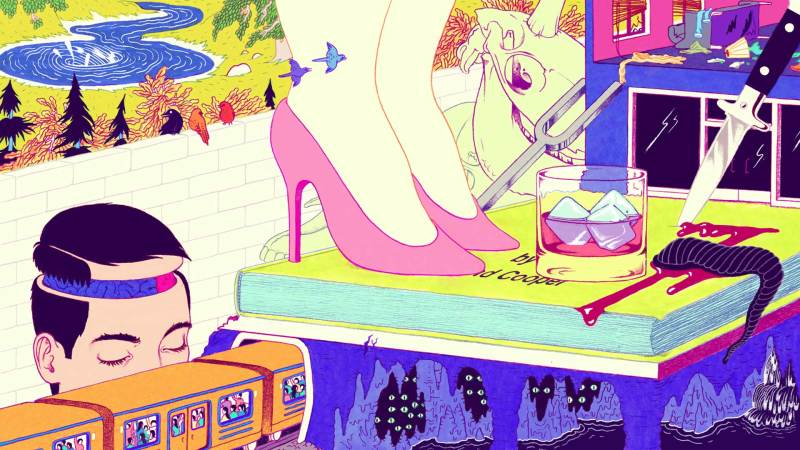“Hard-Boiled Wonderland and the End of the World” is Japanese writer Haruki Murakami’s first total break from realism, and many have argued that it prefigures Murakami’s unique surreal style in subsequent works like “Kafka on the Shore.” The novel features two stories in different worlds that alternate by chapter: “The End of the World” and “Hard-Boiled Wonderland.”
“The End of the World” portrays humans without humanity. Inside a high wall lies an inescapable village, in perpetual isolation and fixity. The villagers, whose shadows have been stripped off, live a life without desire or memory in eternal tranquility. Compared to the fast-advancing storyline of “Hard-Boiled Wonderland,” “End of the World” proceeds with a deliberate delicacy and calmness — villagers perform their daily rituals, and the protagonist works on the reading of “old dreams.”
No hatred, no conflicts and no need to exercise freedom. Such perfection and tranquility terrify us — instead of a voluntary relaxation, this tranquility is being forced upon the villagers, as if happiness and calmness are nailed to their foreheads.
Shadows symbolize the colorless humanity not expressible in light; shadows are the radical privacy not shareable by any means. The wall around the shadowless villagers exposes them completely, censoring them, absorbing their individualism and making them addicted to censorship. They no longer have to search for what is valuable; everything is given and readily made for them. Their lives are no longer about themselves but something else — the wall — which provides a tremendous sense of security and ease.
Murakami is an anti-militarist, and this surreal metaphor of wall and people’s shadows perhaps reflects a real situation in the 20th century, that is, when Japanese were sold the “high wall” built by the emperor, which they followed faithfully by supporting rabid expansionism to fulfill inadequacies within themselves. Every time a student says, “I don’t have a choice but to choose this type of major and find this type of job because they promise me a secure future,” Murakami’s wall grows higher and more intimidating.
In “Hard-Boiled Wonderland,” meanwhile, humans retain their shadows, a darkness each must drag in an open world without the security of the wall. The helplessness and passivity of life are mercilessly exposed — the protagonist in “Hard-Boiled Wonderland” is merely a nameless worker in the data security industry, but after processing some key data for a professor, he is chased and tortured by various interest groups. In a world where every choice amounts only to uncertainty and bad ends, and where the protagonist must be responsible for the arbitrary consequences following his choice, is pursuing freedom still worthy?
There is no hero in “Hard-Boiled Wonderland.” All it has are ordinary people like us — they struggle deeply in life, with their weaknesses and often fatal flaws. No grand portrait like a Greek tragedy, nor witness who sheds tears for their sufferings. They often fail, but must endure the pains silently without a single repose; they sometimes succeed in their struggles, after tremendous cost, but there is no applause, nor flowers thrown for those who will continue the same nameless life one more day.
Many Stanford families, faculty members and low-income students are struggling terribly during the COVID-19 crisis. Most of them defend their families just as bravely as our protagonist. Though some attention and resources are given, the difficulty remains ultimately unsolved. When the attention fades in the loud social background, they must continue to battle without a choice.
“Hard-Boiled Wonderland” is the surreal embodying a real situation about characters like us: Amid the plenitude of political catchphrases, we struggle with the triviality of daily life and endure silently.
“End of the World” and “Hard-Boiled Wonderland” present two choices: surrender ourselves to social pressure and become secure with a sense of belonging to something external and greater than ourselves, or be faithful to ourselves and tolerate the malice of life.
As Romain Rolland wrote, “There is only one true heroism in the world: to see the world as it is, and to love it.” To choose the world of “Hard-Boiled Wonderland” means to live in the anguish of freedom, in the radical uncertainty opened by choices, so that perhaps we can find authenticity one day. To choose the wall in “End of the World” is to accept the values and doctrines exerted on us and conform, but with greater security and peace.
In the end, no character is given a name in “Hard-Boiled Wonderland and the End of the World.” In the absence of particularity, the characters embody a universal dilemma of what we believe and how we behave. The novel ends with uncertainty: “All that is left to me is the sound of the snow underfoot,” and the burden to choose between two ways of life is thus left to us.
Contact Owen Shen at owenshen ‘at’ stanford.edu.
